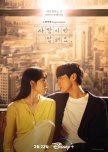
An uncommonly, almost tenderly told revenge story
"Call it Love" begins with a quote from a writer about love, followed by a voiceover radio announcer's summary: "To understand the loneliness of others, for me, that's the beginning of love." Beautiful, sensitive words... and at the same time: the grounding of this KDrama.There are so many lonely people out there (even if that doesn't necessarily mean they're alone). There are also those who recognize the other in their loneliness. Love in different facets swings back and forth between each episode - quietly, tenderly, unspoken, then also outspoken, sometimes here, sometimes there. In the case of Shim Woo-joo and Han Dong-jin, despite barriers love like determined water finds its way.
The KDrama offers no ´boom-squish´, no spectacle, yet slow food for the heart. So slow, that it almost touches the edge of the bearable at times. Watching the two protagonists moving through scenes is almost like in slow motion. The facial features are minimal, too. However, it´s nevertheless expressive and intense. Tender emotions are held back, an the next moment some razor-sharp thoughts are communicated without hesitation – Woo-joo is good at that. She embodies a sharp mix of disinterest and impulsiveness. Dong-jin, for his part, is the master of outward indifference and equanimity, enduring life´s challenges quietly and good-naturedly – almost stoically. But both are basically victims of their learned helplessness and of being overwhelmed with their extremely ambivalent feelings towards their own parents. ´She´ is still bitter because of her cheating father, who left the family for another woman. His burden is his exalted mother, who notoriously charms other people's husbands and lives a ´good life´ at their expense, with her son being in the way and left with the father.
A web of loving people are surrounding both Woo-joo and Dong-jin. So, even if they may feel alone with their feelings, they really aren't. Woo-joo's friend, the pharmacist Yoon-jun, feels a lot more for Woo-joo. Dong-jin's school friend and business partner knows his buddy like the back of his hand. Then there's Woo-joo's sister, who for her part is struggling with dating and finally just discovers her feelings for Yoon-jun. And suddenly Dong-jin's ex-fiancé is back, who left him without a word a year ago, went to the USA and is now suddenly back, being ready for the next step. ... Somehow everyone seems a bit lost and sometimes awkward in their emotional life, as well as in their (traditional) family liabilities. They might feel lonely. But they are actually not alone.
Technically speaking, the plot aims for something completely different than romantic love: revenge is the driving force of the story. There's Woo-joo on her vendetta against the woman who stole her father and secured the house as an inheritance – with the vendetta actually targeting the son, Dong-jin. Then there is Dong-jin's former boss, who wants revenge for Dong-jin resigning along with his childhood friend from school to start a rival business. And there's the age-old dynamic between Woo-joo's mother and her rival who stole her husband years ago...
Somehow like balm: here the revenge motive can't prevail in the end. Rather, a gentle template of compassion and forgiveness settles over resentment and bitterness. Like a silk scarf, this compassion covers the wounds and thus changes, rather widens, the perspective. "To understand the loneliness of others, for me that is the beginning of love." In the end the truth of these words is revolving about much more than 'just' romantic love – the heart empathically banging on another one´s wall, makes the wall come down and healing become possible.
Gaze, movement as well as camera angles are chosen with care. Like that more than once time is frozen, sort of. Often enough, this KDrama is deliberately so slow that you might want to give the protagonists a nudge here and there. Paradoxically, this perceived standstill envelops the actually quite dynamic story, which gains its drive from the revenge motive and knows very well how to come up with tension, too. This idiosyncratic mixture of dramatic events and moments of standstill, of revenge and honest love, results in a very unique, ambivalent, subtly burned-in dynamic and elusive fascination for this KDrama. Cupid interjects encouragingly and does it well. Actors and actresses also successfully correspond with authentic emotion.
Ultimately, an uncommonly, almost tenderly told revenge story.
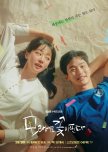
Sometimes grumpy & gruff, sometimes touchingly sweet & unabashedly sincere, radiating joy & warmth
“Like Flowers in Sand” is enchanting in its own way. Here we have once again a KDrama with a distinctive aura. Rustic, with tons of heart, original characters and great performance. Without tons of make-up, yet with plenty of bare male torsos - here, for a change, not focusing on aesthetic ideals… (which sort of makes this KDrama even more likeable and even more authentic.) Love also has a subtle hand in it here and conjures up a rather unconventional Rom+Com in the guise of a crime thriller.“Like Flowers in Sand” takes a look at the rural regions – with their living traditions, the lively gossip and the importance of lifelong childhood friendships. The way people interact with each other is a little rough, but still warm; sweet even, yet in a grumpy disguise.
The KDrama draws its significant charm from the tradition and lifestyle of the Ssireum wrestlers. The two protagonists grew up with Ssireum (see side note below). In general, Ssireum marks the dramaturgical pivot of the story - then and now.
The gym, the sand-filled wrestling field, the colorful ´satpas´, and the ML tirelessly running here and there and back again, all of this contributes to an unmistakable look&feel. In addition, "Like Flowers in Sand" is sometimes grumpy and gruff, sometimes touchingly sweet and unabashedly sincere - with three-dimensional, unconventional characters in their unique individuality quietly conquering the hearts of the audience. A KDrama solidly grounded in the life of ordinary people, that in its quirky, eccentric aura radiates joy and warmth.
----------------------------------------------------------------
SIDE NOTE: --- Ssireum – Korean version of wrestling ---
Ssireum has been listed as a UNESCO immaterial world heritage since 2018. This distinctive Korean wrestling is probably as old as the first kingdom of Korea itself, which according to legend was founded in 2333 BC. What is certain though, this form of wrestling has already been practiced during the time of the Goguryeo Kingdom. The strongest young men from the surrounding villages came together for competition, with the last man standing at the end being the winner.
Ssireum is the wrestling of two people within a circular field filled with sand with a diameter of 8 m. So-called 'satpas' form a kind of belt over the wrestling pants that the opponents at all cost hold on to during the fight - until one can bring the other down by strength or skill. The techniques are varied, but hitting and pushing are not among them.
Actually, previous to colonial times, this type of wrestling was known as Gakjo, Gakhi, Sangbak, Jaenggyo or Gakgi. Wrestling was tolerated under the Japanese because it had similarities to sumo. Competitions were successively sponsored, which ultimately led to national championships. To this day, Ssireum is an established and popular sport in South Korea being practiced by women, too.
Eventually, with Netflix broadcasting this ENA Production internationally, the immaterial cultural heritage is reaching more worldwide attention, too...
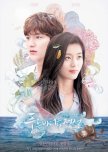
Fun. Touching. Plus light-heartedly questioning the matter of course of human interaction
"The Legend of the Blue Sea" refers to a very old Korean legend that originally tells the lovestory between a mermaid and a fisherman. However, the KDrama is just loosely based on this fairy tale.In the rich Korean folklore of "Imuldam" (mostly oral shamanic songs, myths, fairy tales and folk tales) which is still very much alive today, there are frequently supernatural beings that move around in the earthly dimension - whether mermaids, a nine-tailed fox, a Goblin, or other spirits. These "Imuldam" are particularly inspired by shamanism and Buddhism. KDramas repeatedly pick up motifs from this tradition and find contemporary ways to keep them alive and reinterpret them. The special attraction arises from the fact that our human world receives a different value, appreciation and perspective through the eyes of those non-human creatures less influenced by time and space.
"The Legend of the Blue Sea" is based on a mermaid caught in a net by a fisherman in the early Joseon era. Then he fell in love with her. However, mermaids rarely feature in Korean folklore otherwise. The topic makes a nice link to western tradition and that's probably how it was intended. Also, parts of the KDrama play outside of South Korea - in Spain.
At the same time, the story takes up another, widespread and popular motif in KDrama orbit: reincarnation. Most of the time it is about souls that were not able to complete certain experiences in the past and are confronted with these or similar situations again in their present incarnation - in order to do things better or differently. In "The Legend of the Blue Sea", the historical fairy tale from back then and its version, transposed into the present day, are developed in parallel in two narrative threads. Just as the protagonist (and also another character) slowly (again) remember their past life, we, too, experience what really happened back then. Eventually the question arises whether life must necessarily repeat itself or else other decisions could be made.
Actress Jun Ji-hyun obviously enjoys her character as a humorous, mischievous mermaid, innocently and ignorantly experiencing the modern human world. With her performance she definitely jazzes the story up. Her sometimes almost naive trust, which is a bit reminiscent of a puppy in places, stands in warming contrast to the distanced, calculating coolness of her Jack of Hearts in 2017. The picture is completed by - here and there - being able to look back into their Joseon past, where he rather personifies an amorous, honorable nobleman.
Ultimately, this KDrama offers a well-designed dramaturgical variety of telling an enchanting love story in two different ways - and at the same time (with a twinkle of an eye) questioning the matter of course of human habits and interaction.
It´s fun and touching.
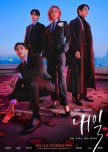
Soulful spot on: South Korea ranks fourth in the world when it comes to the suicide rate
According to WHO data, South Korea ranks fourth in the world when it comes to the suicide rate. (Germany ranks 42nd in comparison.) Not only stars and starlets are affected, but it runs through all sections of population. And with that, it holds up a bitterly serious, socially critical mirror to turbo-capitalist South Korea, whose tradition still places more value on appearances/make-believe than authenticity/true-being."Tomorrow" throws the spotlight on this socially problematic aspect. It is definitely a tough topic! It is based on a webtoon that enriches people's limited view by looking at the bigger picture from the perspective of the spiritual world. By providing an emotional link between the two worlds through the protagonist Choi Joon-woong, the worlds inspire each other with their insights and impulses. (After all, a wound can even heal in the afterlife...)
In short, the approach might at times seem light-footedly playful. Yet the content is profound and serious. It´s no feel-good-series. Sometimes it's fast-paced and action-packed, sometimes tongue-in-cheek, but mostly the story wants to touch, move and make you think. And it does. Overall the narrative style once again finds the right tone and the successful mix to work through the difficult, complex emotional area of conflict. Thus it is carefully, sensitively and differentiatedly illustrating the example of very different fates.
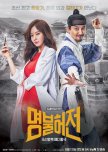
Time-travel with an enchanting encounter between traditional medicine & modern medical technology
Because "Live up to your Name" chooses time travel as the starting point for the action, the KDrama is able to contrast traditional medicine as well as modern surgery and medical technology in two historical time zones. This sprinkles a lot of color over the topic and opens up a perspective that does not have to polarize. This rapprochement is rounded off by the enchanting development of the relationship between the protagonists - the modern day surgeon in modern Seoul and Heo-im from Joseon days, who get emotionally involved over the course of the story, although their personalities could not be more different."Live up to your name" juxtaposes modern surgery & medical technology as well as traditional Korean medicine, which is recently becoming more and more popular in the increasing medical tourism in South Korea. In this context, the audience is introduced to a luminary of traditional Korean medicine who made a considerable contribution to acupuncture in his time (16th century) - Heo-im. The KDrama guarantees an entertaining and lively excursion into some background knowledge about attitude, methods and possibilities of traditional medicine.
Just seeing Kim Nam-gil as Heo-im is worth watching this KDrama. He does an excellent job of portraying the ambivalent personality: there is the simple man from a poor background, whom he would like to escape at any price, and there is the ingenious healer with almost spiritual talent. Sometimes it's quite funny and then again heartwarming and profoundly serious with confident lightness.
In addition, there are the traditional healing methods, the virtuosity in handling the acupuncture needles and the feeling for the flow of energy... this can not only be experienced with the example of Heo-im, but also with the other representatives of traditional Korean medicine. There is also room for dealing with those for whom traditional medicine is mainly a business today - a service that can be sold very well in South Korea these days, especially with a VIP upgrade as a trendy, exotic treatment method in the context of medical tourism. There are the VENDORS of traditional Korean medicine and there are the HEALERS of traditional methods. And then there is modern medicine and the growing market of the health industry. Eventually, what makes the difference (and also offers the common ground between paradigms) are the attitude, dedication and mission when it comes to healing...
------ SIDE NOTE: --- Historical Heo-im (1570-1647)---
His reputation as an acupuncturist preceded the historical Heo-im of his time - not only in the Joseon Dynasty itself, but as far away as China and Japan. Originally he was of humble origin, but due to his incredible achievements in medicine he became the personal physician at the royal court and a government official at the age of 30. During the Japan War, he was able to further expand his reputation through his gifted achievements in acupuncture. However, the nobles rejected him as their equal and excluded him, so that he returned to his village at the age of about 50 and practiced his healing art on the common people there until he died at the age of 77. In recent years he has written a large, well-regarded work, the ChimGuGyungHumBang (book on acupuncture and moxibustion). In it he describes his methods of pain management and procedures in which acupuncture points are not (only) stimulated by needle sticks, but also by heat.
-----------------------------------------------
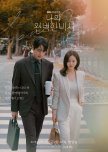
Soothing sweetness of a healing Love Story in the midst of brutal, relentless Seoul business life
"Love Scout" offers a cozy, soft and warm love story for the heart. Here: embedded in the tough Seoul office workday. Also: it offers perfect KDrama craftsmanship for this genre. Somehow everything was done right. The social network of our two protagonists also fits perfectly into the whole. Additionally, there are quite some valuable messages between the lines. And then there is the soothing sweetness of a healing (fictional) KDrama-world in the midst of the harsh, intrusive, inhumane, unvarnished reality."Love Scout" conjures up a sweet love story in the brutal, relentless professional everyday life in Seoul 2025. On top of that: a workplace romance between a female boss and her male secretary is not exactly the easy choice.
The story has a certain sweetness to it, also thanks to 7-year-old Byeol. She actually manages to bring out the best in everyone, aiming directly at the heart.
However, the backdrop of the drama – or rather that of our two protagonists - is actually rather sad.
SHE is a successful businesswoman with good instincts, running her own headhunting agency, but along the way she has somewhat lost touch with herself – she has sort of cut off her needs. The price of her success is high. She is a workaholic, exploiting her body, and just as she tramples over her own needs, she does the same with those of her employees. Apart from work, she practically has nothing. The advantage: her (guilt) feelings are buried under workloads. No time to delve deeper.
HE has perfected the art of anticipating the needs of others. As a single father, he has everything under control. Admirable. But on the downside, he is almost compulsive, as he has no other choice – he cannot help but recognize the needs of others before they do. His antennas are completely tuned to his environment. Thus, he comes across as quite sympathetic, as he is the nice neighbor, friend, colleague... However, as a single parent there is hardly any room for his own needs either. He defines his joy mainly through the joy and satisfaction of others. This inevitably makes him not necessarily alone, but still somewhat lonely. And there, deeply buried, are well-hidden (guilt) feelings, too.
Both our FL and ML are quite efficient. Almost perfect. But both also work like highly efficient machines. In this, they are similar and can each see behind the facade of the other. A good start for a healing love story. A healing story overall, in the midst of a structurally sickening, toxic work environment where there is no place for human beings with human needs – for appreciation, sincere recognition, fairness, and enough regeneration time to recharge their emotional and physical 'batteries'.
The dance of FL and ML, performed on this stage, is touching the heart. Tender, at times playful, heartfelt. The encounter between the boss and her secretary becomes a gentle rapprochement between two people who are so cut off from themselves and their own needs, yet reflecting, recognizing, opening up and learning to love each other in this very aspect.
It is an overall good mixture. A love story with charming side plots, balanced in a well-proportioned way with socially critical issues. Those who wish, may condone the seriousness. And those who appreciate the earnest critique, will generously be served. Thus, in my eyes, „Love Scout“ offers quite salubrious and gratifying KDrama-delight.
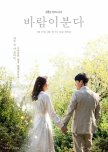
Years after the “Yes”-word, and yet a substantial love story, touching without being kitschy
"The Wind Blows" sounds quite inconspicuous, but it is not. It turns out to be a moving love story. Actually it is rom+/-com that starts exactly where other love stories end: with the ´yes´ word. The KDrama tells of what can happen when the butterflies (in the face of the new) are followed by ordinary years of shared, sometimes painful everyday life relationship... But that's not why love has to be gone missing. On the contrary... yet eventually, love might find it harder to take its space...The title "The Wind Blows" refers specifically to the moment when the two protagonists first met many years ago. At that time the wind was blowing. What started then is not over yet. Figuratively, the wind is still blowing. However, the everyday challenges of aging have now added to their married life. The two must meet those challenges. It is rather common that one may be tempted here and there to make solitary decisions instead of communicating. One may have doubts if there still can be a way together. Every now and then it seems that such a common path is not (or no longer) possible. And then, maybe, one or the other might open up again.
"The Wind Blows" tells a serious and profound story about a love relationship that has grown out of the first romantic phases. Generally, this is less wanted on screen, as it inevitabely comes with problems, arguments and breakups. (Somehow that's in the nature of relationship - the constant rubbing against each other in a wide variety of ways actually leads to feeling/sensing yourself and the other person in the first place... it doesn't work without it. Does it?) In this KDrama, problems, arguments and breakups are all in, too. But so is love. (...as so often, although we might fail to notice in the midst of turmoil.)
I don't want to hide the fact that Alzheimer's disease is involved here as a stab in the back and at the same time a second chance. Against this background, the story manages to tell sensitively, empathetically and at times ruthlessly about the bumpy stretches of a patient love that has been and remains there over time - even if it is experienced differently over the course of the years, perhaps sometimes cannot be shared and also has changed its forms of expression over time.
The sensitive processing and the emotionally intense acting (great: Kam Woo-sung and Kim Ha-neul) are KDrama quality at its finest, which has once again proven itself to be just perfect for dealing with such a complex subject, which is difficult in several respects. A substantial story, touching without being kitschy.
(Well, I didn´t need the slightly shallow subplot and few unnecessarily humorous sequences here and there. Yet they obviously tried to loosen things up... well...)
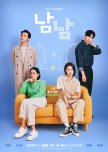
In a unique way affectionately told. Critically nuanced. Not off-the-shelf. Still easy to digest.
I might have easily missed “Not Others”, if I hadn't volunteered to help out with the German subtitling. I'm glad I didn´t miss it, because "Not Others" turned out to be an unorthodox surprise - being unexpectedly substantial and also pleasantly true to life, thus rooted in a rather simple, normal, everyday world. It is the story of a family, above all of a single mother and her daughter, but there are also a few contemporaries who are related by blood or by choice.The story goes on and on as life goes on and we go with it as a matter of course (and gladly so). (Well, at least that's how it was for me.) There was nothing particularly extraordinary and exciting about it. Just normal madness.
Well, admittedly, a bit more than normal madness... after all, the mother herself is still a teenager when she has her child and doesn't want to give up on some of the youthful pleasures in life - regardless of responsibility for the child. However, the script and the two leads find a good pitch for this very special, unusual and inherently difficult relationship dynamic with all its challenges. A clearly structured 'I'm the grown up and you're the little one' doesn´t exist. It is rather upside down here. Instead of the classic authoritarian hierarchy between parent and child, they both ended up bonding as allies sort of, in a world from which they have fallen. Due to the unusual role constellations, the arguments between mother and daughter often have a slightly funny touch. Behind this, however, lurks a rather unconscious overburdening on both sides. And this earnest approach of this emotionally tricky situation shines through again and again in the strategy of both of them trying to cope with everyday life. However, mother and daughter are overall impressing with their casual authenticity as well as pleasant directness and openness - a communication style that clearly sets them apart from so many others in the story. Choi Soo-young shines here, but especially Jeon Hye-jin, who can show herself from a completely different side in the role of the still youthful mother...).
At some point it's about a criminal case - eventually almost symbolic for the unwanted and eventually professionalized role of the daughter within the mother-daughter-relationship: the need to/the urge to look after her mother. And at some point it's also about romantic love - symbolic for the very human longing to rely on a partner on eye level, to lean on a shoulder... This human need actually concerns mother and grown-up daughter alike. But can there even be a place for 'outsiders' within the mother-daughter relationship?
Please don't take "Not Others" as a crime thriller or even as a RomCom. (The men in particular come along rather secondary...) Ultimately, it is the complicated emotional behavior patterns that characterize the family life of mother and daughter in the context of their very close and extraordinary relationship. This makes the KDrama breathe in and breathe out in its very unique pacing. It is primarily about this uncommon family, with an affectionate, yet critically nuanced look at their very special relationship dynamics. "Not Others" is cautiously questioning established (conservative) family models, too...
Overall, “Not Others” is no off-the-shelf KDrama (like so many others in 2023...).
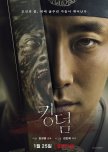
Epic&Bloody journey into bygone times - stately costumes, impressive landscape, elaborate details
"Kingdom" marks a new concept in the KDrama orbit. In 2019 the cine drama was born. This describes a kind of hybrid production with film studios being involved in drama series and movie directors hired for the production. Cinematic camera therefore has since then become characteristic. "Kingdom" was the first original Netflix KDrama production and is thus repeatedly mentioned as a pioneer in this cine drama genre."Kingdom" is an impressive, idiosyncratic mix of colourful historical drama and bloody zombie thriller.
In the broadest sense, the story relates to the so-called Imjin War, the Japanese invasion between 1592 and 1598.
--------------- SIDE NOTE: History meets fiction
The KDrama specifically (but losely) refers to the Battle of Sangju (1592) in the Upo Wetlands. At that time General Yi Il had the problem that he only had a cavalry of 60 soldiers while he was supposed to stop the Japanese on their advance from Busan to Hanseomg. However, his assigned company, which was supposedly equipped and trained first-class, did actually not exist or was not operational. Either the original soldiers were sick, dead, or gone. The local garrisons were also empty because the soldiers stationed there had been recalled to Daegu. What he got were untrained civilians. With the grain he found in a warehouse, he was at least able to recruit some of them. However, he no longer had time to prepare the ca. 900 commoners for the battle, because the Japanese were already there.
The KDrama picks up on this moment in Korean history and rewrites the story in a zombi spirit: In that desperate battle, the former governor of the southern Chungcheong province, Ahn Hyeon, ultimately took command and led around 500 Koreans against an overpowering army of around 30,000 Japanese. The Koreans were victorious thanks to an unknown "resurrection plant" that can be used to resurrect the deceased as bloodthirsty zombies and, with a little skill, can be used as weapons. So (at least in KDrama) the battle in the wetlands could still be won.
------------------------------------------------------------
Otherwise, the historical setting provides the hook for an epic journey into bygone times with stately costumes and impressive (authentic South Korean) landscape shots, elaborate details and bloodthirsty butchery. (As adult Netflix production this KDrama is exceptionally brutal). The zombies, with their horde-like appearance and yet very idiosyncratic "fighting style", provide a change from the classic battle formations and martial art sword fights, causing a real challenge for the experienced generals as the opponents are already dead... It requires intelligence, creativity and, above all, high speed. The story itself progresses at this high pace. Neverthelss the emotionally essential scenes have been captured in the proven KDrama style: slowly, intimately and with maximum intensity.
As so often it is just a few powerful, scheming people who make life difficult or even impossible for the many. Yet, not only these political intrigues are the driving force of this thriller. First and foremost it is the question about the epidemic origin and how it might be defeated.
Answers to this question require a second season, even a KMovie and most probably a third season, too. Additionally another film spin-off is being planned. Obviously the story about the "resurrection plant" is far from being told.
... and I am ready to set out again with the noble crown prince to find a solution to save his people and the future of his country in the face of this locust-like zombie plague. Thrilling.
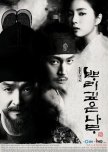
A vividly told emotional story about the creation of Hangul and its impact. Absorbing. Gripping.
Of course, this historical drama is (as many others) full of intrigues, power struggles and revenge. But King Sejong, the 4th Joseon king, who is the historical subject of this KDrama, was indeed a bright shining star in the Joseon sky. So is this KDrama.King Sejong created the Korean alphabet. Not just him alone. But this great achievement goes back to his driving force and his vision of a mature people. The story impressively tells of the bumpy road to Hangul. It also tells of how important it is as an identity-creating medium for self-confident citizens. Previously, Hanja - the canon of sheer countless characters of Chinese origin - was the country's binding writing. Not only that, but a whole range of Korean words are loanwords of Chinese origin - to this day. At the same time, this reflects the asymmetrical balance of power between the Korean dynasties and the Chinese dynasties. The use of the Han signs not only symbolizes the hierarchy among the peoples, but also within one's own people. Scribes and scholars were needed, who had the muse and time to learn these characters (more than 100,000 in total). Thus, they had the authority to interpret. It was hardly possible for ordinary people to learn. A scripture that connotes words and meanings in characters is based on a completely different concept than a scripture composed of a compact alphabet. Based on the phonetics of the Korean language, King Sejong developed an alphabet finally consisting of 14 symbols for consonants and 10 for vowels. The writing system to apply those in a way to form words and sentences can be learned comparatively quickly, even by ordinary people. What a progressive concept at the time! What a threat to the elite of scholars and noblemen!
The title "Deep Rooted Tree" refers to verses from the 'Songs of the Dragons That Fly to the Sky' - the Yongbieocheonga. This contemporary document about the Joseon Dynasty and its legacy was the first book that was ALSO written in the new Hangul writing system.
"Deep Rooted Tree" is (among many other truly exciting dramatic events throughout the story) about the impact of scripture for the people of Joseon - a story vividly told in an absorbing manner. A truly fantastic presentation. With gripping protagonists. Multidimensional. With high emotional impact.
The dramaturgical setting introduces the king (from the perspective of the male protagonist) as the bad guy. But the 24 episodes (analogous to the alphabet?) provide an impressive insight into the fascinating life´s work of that great king - embedded in the excitingly increasing momentum of the vendetta of a boy from humble origins who grows up to become an outstanding warrior and finally ends up as royal guard.
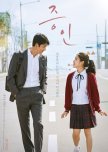
Sensitive, optimistic and even cheerful. No spectacle, and yet the 2 hours somehow fly by.
"Innocent Witness" does not really want to serve any genre. (I assume, in Germany it would have at best as been shown in Television only. Significantly, the movie never made it to European cinemas. Yet, it was shown on the big screen in South Korea and was also shown throughout Asia and Australia. It actually won a whole series of respectable awards. On the list are 55th Baeksang Arts Awards, 39th Golden Cinema Film Festival, 40th Blue Dragon Film Awards, 6th Korean Film Producers Association Awards, 27th Korean Culture and Entertainment Awards and 39th Korean Association of Film Critics Awards ... Those various awards were given for the characteristically sensitive, emotional storytelling and presentation."Innocent Witness" isn't kitschy, it's calm. The story does neither live from driving tension nor offer any dazzling action, just a calm, unobtrusively touching story. The viewers spend a lot of time in the courtroom. However, Law & Order might very well form the framework, but this does not determine what the story is actually about: Communication and reciprocal understanding can only really succeed if you unconditionally focus on the personal world of others, not only your own. This is often forgotten because we think we can easily understand each other when your world and mine seem so similar. (As if we could simply take sameness of a life context for granted.) However, even life perspectives would be similar, this can still not be considered ´mutual understanding´ either. This is mere prejudice. That could work, often does, but doesn't necessarily have to. Most of the time it might fit, so there's rarely a reason to question my personal approach to the world.
"Innocent Witness" is provocative here, because the other person is a young girl with an autism spectrum disorder. In order to reach an understanding, the lawyer and everyone else have to get involved in the world of the protagonist and (arduously?) learn to understand the events and happenings from her perspective. The confrontation with the autistic worldview (in the service of the story quite strikingly, but effectively implemented) may seem crass for most people at first glance, but basically it only demands what we should actually get do in EVERY encounter with every person, with whom we exchange ideas. That is: get involved. Eventually, we are reluctant ... as long as it works otherwise even half-way and the misunderstandings don't catch up with us all too painfully at some point...
"Innocent Witness" pushes the audience to this realization with persistent, warm, quiet tones in a determined and consistent manner. At the beginning there is the girl's question: "Are you a good person?". In the end, the lawyer comes to the realization: "I want to be(come) a good person!" The movie portrays this process purposefully, but quite unspectacularly and without any particular cinematic originality. The gait is characterized by a loving grunt, like a basso continuo, which bathes the punchlines in a warm light and holds the story together on an emotional level. This, however, without wanting to be difficult or too serious. The lacrimal gland is not necessarily strained either. On the contrary, there is also room for a smile, for joy and a good mood.
In short, the essence of the KMovie is the wonderful dynamic between lawyer and witness. Up-and-coming talent Kim Hyang-gi shines in her role as an innocent, often for her autism bullied, young school-girl. Veteran Jung Woo-sung, on the other hand, as a once ambitious human rights lawyer, neither fish nor meat, still single at almost 40, who has gotten a bit off track and becomes seductive because he needs money for his father's Parkinson's treatment. They stumble a little awkwardly into their interpersonal encounter, each in their own way. Dealing with their own feelings and those of others is not their strength. Nevertheless, out of the given need to get involved, a peculiar friendly relationship develops slowly, quietly, subtly, sensitively and sustainably. Initially however, it is quite an ambivalent dynamic. The attorney's original intention is anything but pure at first, when he wants to vet the only witness who claims to have seen his client's murder. In his approach to the witness, he is only concerned with his case and the question of how seriously he must take the witness for the course of his case. The unexpectedly blossoming friendship has an unfair origin that gradually overshadows the encounters. Nevertheless... The two mimes of the protagonists as well as one or the other supporting role have well-earned all their awards, as they embody this dynamic magnificently.
Apparently, the mission of the movie is that people with disabilities are also people with dignity, who we should/must take seriously. Ultimately, however, the mission even goes beyond and demands respectful, serious encounters with EVERYONE - regardless of their origin or clothing, health restrictions or age. We usually avoid those who 'tick' differently, because it seems exhausting and inconvenient to really get involved with someone, e. g. to actually listen, to genuinely want to understand... because this sometimes requires having to question myself and my self-evident attitudes, assumptions and perspectives. It's easier to just take my own worldview for granted on the basis of prejudices as well as superficial encounter and project it onto those around me. Conversely, such an attitude can actually lead to my life becoming superficial... comfortable, pretty, nice and shiny maybe, but superficial...
So, this is a KMovie that plays a lot in the courtroom, but whose verdict on right and wrong is less about the actual legal case - it becomes a mere side issue. It is rather about demanding an honest verdict on our individual ways we interact with our fellow humans: Am I a good person? Am I really listening? Am I truly open to encounters? Are my priorities in life sincere?
"Innocent Witness" doesn't really serve any genre, and yet the story, told in all simplicity, is touching, optimistic and even cheerful. No spectacle, and yet the 2 hours somehow fly by.
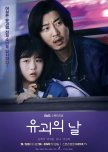
The two leads form a splendidly unique mixture, providing unique heartbeat and appeal to the story
“The Kidnapping Day” is all about its two great protagonists. I'm tempted to say: it is about the female lead character. The actress is simply wonderful and perfect for this character. Nevertheless, in my opinion, in her eccentric role she comes into her own so brilliantly precisely because her adult counterpart: the Kidnapper, who is just the way he is – as a rather clumsy person, he is practically the antithesis of this cheeky eleven-year-old but highly intelligent know-it-all. Yet, he ist the one who is sort of seeing, liberating and nurturing her usually neglected self, that is hidden underneath her intellectual brilliance: First of all she is just a child with all needs that come along. So, he might be not as smart as the little girl, yet he is actually the true grown up, who is not letting him be mislead by her genius, but watching out for her and intuitively caring for the child she is, too. This splendid mixture provides the unique heartbeat and appeal. So together they form this edgy team, keeping the audience in a good mood.The plot offers a lot of humor and quite some comicalness of the situation, but there are also serious themes lingering. After all, there is an unsolved murder case. Furthermore, it is nevertheless a case of kidnapping, even if the prefix may change over time. Added to this is the sad fact that health is often a question of money. And ultimately, behind all of this, there is also the issue of abuse. “The Kidnapping Day” is also able to tackle the ever late-breaking topic of “education hype in South Korea” in an original new way, entangling it in an exciting crime thriller.
What initially starts as kidnapping quickly takes a completely different direction. The victim becomes the mastermind. The police, or at least one of the investigators, dares to think twice and appropriately take unusual paths according this unusual case. Good and evil, black and white, its blurred. Yet, there are still unscrupulous villains. We are also stumbling over complex enmeshments, lying way back in the past.
“The Kidnapping Day” knows how to deliver on a variety of levels. Accordingly, the number of viewers has more than doubled over those 12 episodes. The special charm of the two leads also got me and I was happy to stick with them. Mind you, this was basically because of the charming relationship dynamics of the two leads, and how the two shape the kidnapping scenario along the way in a pleasantly witty way, including the solving of the murder case and at last providing a solution .
P.S.
The two protagonists, their particular relationship, THAT is the clever strength and the endearing piquancy. The rest might at times come across rather careless and pallid. Obviously, this is (once more) the product of the new era that has dawned in the KDrama orbit. Numerous new networks are now happily playing along on the market, including ENA, former SKY, which has repositioned itself in 2022 in order to get involved with its own KDrama productions in the top Pay-TV segment. (ENA belongs to Korean Telekom and produced 22 series in 2023 already.)
In general, with Disney, Netflix and others, I´d say KDrama productions feel like having doubled in 2023 (I didn't count, though). But what seems like a blessing at first sight turns out to be a bit of a sham, too. Where are all the original ideas supposed to continuously come from? And if there is a promising plot idea, it is yet far from being thoroughly worked through... Quantity rarely automatically goes hand in hand with quality. And it doesn't work the other way around either. Accordingly, “The Kidnapping Day” also suffers from the ravages of time: negligence can be observed here and there. However, the main strength and driving force of this story - the strangely lovingly developing relationship of the two unconventional leads - luckily is awesome enough to carry and equilibrate.
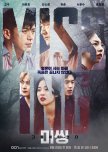
Compelling, grounded in substance, and gratifyingly true-to-life. With a wonderful basic premise
"Missing: The Other Side" seems a bit like a KDrama with a magic hat. The story has the similar effect as the theme of the production: it sort of cavorts in a veiled intermediate world. It could simply be missed out. If you are looking for something in the field of fantasy, the KDrama does not impose itself. It's not fantastic or psychic enough. If you're looking for a thriller, you're more likely to scroll past it. It's not a psychological thriller. It's also not a classic crime thriller. So it seems ... And yet. "Missing: The Other Side" is extremely well done and definitely recommendable. I wouldn´t call the KDrama fantasy or mystery, but rather solid crime genre, in which actually time and space become relative... If only I had known earlier...The KDrama is like an insider tip - although it´s success is not a secret. On the contrary. A second season will come out soon. The story is compelling, grounded in substance, and gratifyingly true-to-life beyond the basic premise. "Missing: The Other Side" doesn't entice viewers with a cast full of dazzling names, but with a fascinating, extraordinary production. A class of its own. The concept thrives on straight simplicity.
There is the radiant simplicity of the brilliant underlying idea: a tribute to the missing. There are actually too many missing people in South Korea - children and women in particular. In more than half of the cases, the missing person is at some point found dead - most of the time several years later. The idea of the KDrama particularly honors those victims by creating a kind of dignified in-between-world for the time during investigation, how long it may ever take. Only then, as their corpse is found, they will part in peace. In the meantime, from the minute the missing person dies until the moment the corpse is found, those souls linger in a beautiful and (mainly) peaceful village among other fellows with similar history. There is a certain charm to respectfully giving such unsolved cases some faces, individual stories, soul, hope & heart - some friendly, reminding space. Even though many missing people´s cases get closed and quite a few may remain unsolved, the KDrama respectfully opens a door to connecting to them.
Granted, the living and the dead share the stage equally. Yet there are no mouldering, half-decayed or slightly moldy ghosts buzzing around. If you like, the idea of "Hotel del Luna" is varied in a less exalted ambience, a little more down-to-earth and less spooky. However, if "Hotel del Luna" was cast with dazzling superstars, "Missing: The Other Side" consistently maintains the simplicity of its concept. Very few KFans will end up following in the footsteps of their 'stars' in this KDrama, they aren't so well known enough outside of South Korea for that. Nevertheless, they all do a splendid job.
Finding the corpses of the missing however requires the living and their down-to-earth investigative work. The knowledge of the deceased can be used. Eventually, there is a catch: it requires living people who happen to be able to SEE and communicate with the dead. The worlds 'here' and 'in between' do overlap in the village of Duon, but only for those with the special gift of perception. A loose team sort of gets thrown together by fate and begins to work more or less jointly to solve some cases that are apparently related in some way. Everyone has to carry some personal luggage, in which missing people play a significant role. One is a crook, his colleague is a hacker, another protagonist works as a detective, another is a widower and father who, even after many years, has not given up the search for his missing daughter.
If you can/want to accept the basic premise of that in-between world, then "Missing: The Other Side" offers an all-round gripping crime thriller. Without any ribbons, but with warm heart. Not highly polished, but atmospheric and impressive. The protagonists are quite three dimensional - no superheroes, but rather ordinary, authentic, tangible. It could be anyone. Lastly, this story would especially happen in South Korea, because in this KDrama the ever so characteristic orphanages and Jaebeol once again got leading roles within the dramaturgical structure.
In case you are not sure, if you should watch, here my advice: Don´t miss "Missing: The Other Side".
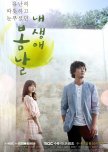
Here it is spectacular not to be spectacular - yet touching and powerful in all simplicity
"The Spring Day of My Life" fulfills the Rom+/-Com concept in a very balanced mix. The humor is not exaggerated, but has an effective, calm charm with its sometimes true-to-life, sometimes intelligent wit. The equipment does NOT want to present the latest from the high-end in terms of fashion & beauty, and the styling is also reserved. Since the KDrama comes along more on the authentic side, the 'Melo' in 'Drama' is also moderate - it doesn't come across as intentionally pathetic, but it goes straight to the heart with all its consequences. This KDrama offers a love story that has a light-hearted side and is giving pleasure while it doesn't strain any fairytale happiness. Yet it rather chooses authentic dramaturgical paths for the development of the story. Optional use for the handkerchief included."The Spring Day of My Life" presents itself as a grounded love story about a single widower with two children and a young woman who, after a heart transplant, carries the heart of his deceased wife. The New Heart with Cell Memory theme is not new to KDrama Orbit. In my opinion, however, there is nothing wrong with picking up on it and telling it anew.
In short: the spectacular is nothing spectacular here, but rather the art of telling a touching love story in all simplicity, yet surprisingly vividly. The two leads marvelous performance makes it work, too. For many, they may not be so well known, but they effortlessly take the audience by the hand. This is Cho Soo-young's first lead role (as far as I know). Kam Woo-sung, on the other hand, has been on screen since the early 1990s - his series partner was still in diapers then... He's an unorthodox, pleasantly idiosyncratic figure on the hero/antihero front. His playing comes without perfected beauty, well-placed chocolate sides and enchanting smiles, but he primarily inspires with his presence, intensity and in places minimalistic efficiency. He always embodies his roles forcefully, authentically and to touch. He doesn't have to collect sympathy points, on the contrary - he likes to show his grumpy, nagging, nasty side.
Obviously the producers were quite generous with flashbacks, but other than that, I don't think there's much to complain. If you're not looking for overly superficial, yet not overly sophisticated entertainment - this KDrama offers comforting heart-ache-smile-and-sigh.
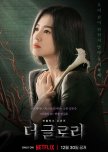
Gripping, intense, a success all round
"The Glory" comes with a drum roll at the turn of the year 2022/23. With a high-end production team in every instance, "The Glory" cleverly intertwines the burning subject of bullying with the long-running topic ´revenge campaign´. The result is gripping, intense, a success all round. (However, one major criticism: Netflix cuts the story in half with a long break in between.)In 2022, for the sad issue of bullying, streaming services cleared the stage several times with their own productions (e.g. "Weak Hero Class 1" and "Revenge of Others"). All of these stories are unbelievable in their brutality and cruelty - teenagers against teenagers! No mercy. Without pity. Without scruples. Without any feeling of guilt. For once, I don't want to blame the streaming providers for the shown cruelty, on the contrary. Maybe the topic is in better hands with them because they have no problem with such radical scenes (compared to TV stations). Isn´t it simply scandalous that such unbelievable violent abuse - and may it be only half as drastic - is part of everyday life in (i.e. South Korean) schools and among young people? Even more scandalous: parents and teachers tolerate it or actively support it and even act up themselves.
"The Glory" swings back and forth between past and present and thus draws a complex picture of the individual characters. Back then the perpetrators, they are becoming victims today. Back then the victim, she finally wants to get out of her role and also make life hell for her abusers. The painful past provides the moral framework, allowing the audience to nod off the plans for vigilantism. Eventually, the protagonist also gains helpers on her way.
Sad enough, in "The Glory" no one is truly happy with their life except for the perpetrator's (still) innocent little daughter.
The bullies of that time live bored and/or stoned and still trapped in their bullying role. Still tangled up in their clique from back then in uneasy ties. None of them found ´true´ friends. Trust and love are words without substance in their life, which rather appears as a shiny variation of Hell disguised with silk and glamourous accessories.
The victim of that time, on the other hand, has found meaning, direction and grounding in her life, no matter how sad the circumstances. Coincidentally, she even made trustworthy friends. Since she has experienced firsthand what hell is like, she can at least distinguish it, as other experiences of brief moments of happiness are also indicated in between. This experience (how happiness actually feels compared to suffering) puts her ahead of her opponents, who aren't even aware that they're living in a hell of emotional emptiness. They only suspect it when Moon-Dong-eun threatens to shake their house of cards and they have to face the illusions of their self-satisfied lives.
The story isn´t completely told yet - after 8 episodes. We will see, how things actually turn out for Moon Dong-eun, as she is indeed messing with someone, who is not willing to give in, whatsoever...
---------- EDIT after finishing the SECOND SEASON: -------------------
Well. Second season is definitely on the revenge-side. Some may say revenge is sweet. In any case it is drastic. And "the Glory" made sure, the mean-spirited deserved it... Among them is so much violence and exorbitant abuse. Almost too much to bear at times. A bit overdone maybe with unnecessary Netflix ruction here and there. Nevertheless suspenseful. Certainly with a coherent ending.
-------------------------------------------------------------------------------
PS.:
Actually, the screenwriter is herself mother of a high school student...)
----------------------------------------------------
SIDE NOTE: ---- Fiction and reality are not that far apart ---
Some might say that the bullying brutality in "The Glory" - such as the curling wand scene - was exaggerated.
In fact, in South Korea in 2006, there was just such a case.
At a middle school in Cheongju, a student was bullied for money by three classmates. For not delivering, she was beaten with a baseball bat, tormented with a barrette, kicked, hit with fists, and burned on her arms with a hot curling wand. The burns didn't even have time to heal because the girls checked the temperature of the curling iron on the victim's arms again and again every few days. On the contrary, healing blisters were specifically removed by the bullies with their fingernails. The brutal beating also resulted in an injury to the tailbone, which resulted in a six-week hospital stay.
In fact, in this actual case in Cheongju, the perpetrators were apparently officially punished after the victim, despite threats, reported the perpetrators by name. And not only the perpetrators, but also the school administration and teachers were apparently sort of admonished. (However, with that the police report ends. We do not know how the victim, the perpetrators and the school dealt with each other afterwards).
--------------------------------------------------------


 10
10 42
42 15
15




















